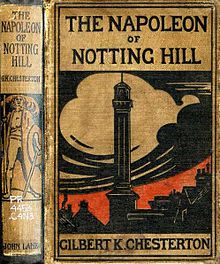The Napoleon of Notting Hill
 cover of The Napoleon of Notting Hill | |
| Author | G. K. Chesterton |
|---|---|
| Language | English |
| Genre | Literature |
| Publisher | Bodley Head (first edition) |
Publication date | 1904 |
| Publication place | United Kingdom |
| Media type | Print (hardcover) |
| Pages | 300 pp |
| ISBN | 0-486-26551-X (recent edition) |
| OCLC | 22346022 |
| 823/.912 20 | |
| LC Class | PR4453.C4 N3 1991 |
The Napoleon of Notting Hill is a novel written by G. K. Chesterton in 1904, set in a nearly unchanged London in 1984.
Although the novel is set in the future, it is, in effect, set in an alternative reality of Chesterton's own period, with no advances in technology or changes in the class system or attitudes. It postulates an impersonal government, not described in any detail, but apparently content to operate through a figurehead king, randomly chosen.
Synopsis
The dreary succession of randomly selected Kings of England is broken up when Auberon Quin, who cares for nothing but a good joke, is chosen. To amuse himself, he institutes elaborate costumes for the provosts of the districts of London. All are bored by the King's antics except for one earnest young man who takes the cry for regional pride seriously – Adam Wayne, the eponymous Napoleon of Notting Hill.
While the novel is humorous (one instance has the King sitting on top of an omnibus and speaking to it as to a horse: "Forward, my beauty, my Arab," he said, patting the omnibus encouragingly, "fleetest of all thy bounding tribe"), it is also an adventure story. Chesterton is not afraid to let blood be drawn in his battles, fought with sword and halberd in the London streets between neighboring boroughs; Wayne thinks up some ingenious strategies, and Chesterton does not shrink from the death in combat of some of his characters. Finally, the novel is philosophical, contemplating the value and meaning of man's actions and the virtue of respect for one's enemies.
Influence
Michael Collins, who led the fight for Irish independence from British Rule, is known to have admired the book.[1] There has been speculation that the setting of the book prompted the date chosen for the setting of George Orwell's Nineteen Eighty-Four.[2] The novel is also quoted at the start of Neil Gaiman's novel Neverwhere.
Both the novel and Chesterton's The Man Who Was Thursday are referenced in the 2000 video game Deus Ex
Notes
- ^ "This was the man who wrote a novel called The Napoleon of Notting Hill, which inspired Michael Collins to lead a movement for Irish Independence." Who is this guy and why haven’t I heard of him?, lecture by Dale Ahlquist, President, American Chesterton Society
- ^ McCrum, Robert (May 10, 2009). "The masterpiece that killed George Orwell". London: The Observer. Retrieved May 24, 2009.
References
- Bleiler, Everett (1948). The Checklist of Fantastic Literature. Chicago: Shasta Publishers. p. 77.
External links
- The Napoleon of Notting Hill etext at G. K. Chesterton's Works on the Web.
- The Napoleon of Notting Hill at Project Gutenberg (with illustrations by W. Graham Robertson)
 The Napoleon of Notting Hill public domain audiobook at LibriVox
The Napoleon of Notting Hill public domain audiobook at LibriVox- Dale Ahlquist: Napoleon at Notting Hill, Lecture 6 of the "Chesterton 101" of the American Chesterton Society
